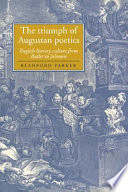 | Blanford Parker - 1998 - 282 pages
...relation of the human soul to God. The words of scripture, the work of God, comes to us unadorned and "it can receive no grace from novelty of sentiment, and very little from novelty of expression" (Life of Watts). Religious effusion is to "be felt rather than expressed," and the "ideas of Christian... | |
 | Scott D. Evans - 1999 - 180 pages
...indiscriminate representation emphasize the aesthetic. In the Life of Waller, for instance, he says: Poetry pleases by exhibiting an idea more grateful to the mind than things diemselves afford. This effect proceeds from the display of those parts of nature which attract,... | |
 | Samuel Johnson - 1825 - 530 pages
...invention ; such invention as, fay producing something unexpected, surprises and delights. The topics of devotion are few, and being few are universally...exhibiting an idea more grateful to the mind than things themselves afford. This effect proceeds from the display of those parts of nature which attract,... | |
 | Samuel Johnson - 1821 - 474 pages
...invention ; such. invention as, by producing something unexpected, surprises and delights. The topicks of devotion are few, and being few are universally...sentiment, and very little from novelty of expression. rfient of those which repel, the imagination : but Religion must be shown as it is ; suppression and... | |
 | Elsie Elizabeth Phare - 1967 - 170 pages
...invention: such invention, as by producing something unexpected, surprises and delights. The topics of devotion are few, and being few are universally...sentiment and very little from novelty of expression." I should imagine that, as a rule, those who know what contemplative piety is would feel that they were... | |
 | 1825 - 578 pages
...us pass to the next objection. ' Poetry pleases by exhibiting an idea more grateful to the mind than things themselves afford. This effect proceeds from...the display of those parts of nature which attract, and the concealment of those which repel, the imagination: but religion must be shown as it is; suppression... | |
 | Frederick Robert Tennant - 1928 - 448 pages
...something shall be said later. Turning to another art, we may recall Dr Johnson's description of poetry: "poetry pleases by exhibiting an idea more grateful to the mind than things themselves afford. This effect proceeds from the display of those parts of Nature which attract,... | |
| |